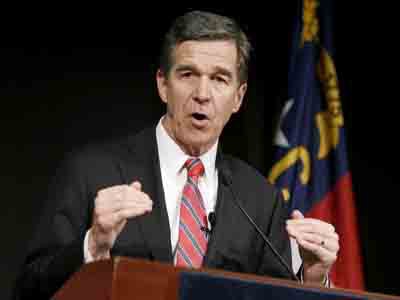North Carolina voted on Thursday to repeal HB2, a controversial law known as the “bathroom bill.” Republicans and the state’s new Democratic governor described the replacement, HB 142, as a compromise. Nevertheless, the replacement bill elicited strong criticism from a diverse coalition of sources since its introduction in the state senate on Wednesday night.
 North Carolina Gov. Roy Cooper
North Carolina Gov. Roy CooperHB2, which passed in March 2016, was a state law that affected the LGBTQ and transgender community in two critical ways. First, it overturned and banned statutes protecting LGBTQ people from discrimination based on their sexual and gender identity. Second, it required individuals to use public bathrooms and locker rooms that correspond with the gender on their birth certificate in government-run facilities, including public schools, colleges and universities.
Transgender and LGBTQ advocates said that HB2 is discriminatory, and fought to see it repealed. Proponents of the bill said that it protects women and girls using public bathrooms and locker rooms from the threat of potential sexual predators.
HB 142 retains elements of HB2, including a three-year prohibition on municipalities from passing ordinances that would regulate private employment or public accommodations. In other words, cities would be barred from enacting measures that would protect LGBTQ rights as well as measures designed to protect workers or raise the minimum wage.
“The best thing North Carolina can do is to simply repeal HB2,” National Center for Transgender Equality Executive Director Mara Keisling said on Thursday.
The three-year moratorium would have an impact on liberal-leaning cities such as Charlotte, which passed an ordinance in February 2016 that protected LGBTQ individuals from discrimination and gave transgender people the right to use public facilities corresponding with the gender they identify with. HB2, which was intended to reverse Charlotte’s ordinance, took things a step further by placing a moratorium on similar ordinances on all municipalities.
“After more than a year of inaction, today North Carolina lawmakers doubled-down on discrimination and cemented North Carolina’s reputation as the worst state in the nation for LGBTQ people,” Human Rights Campaign President Chad Griffin said in a statement on Thursday afternoon. “This bill does nothing to repeal HB2. Instead, it institutes a statewide prohibition on equality by banning non-discrimination protections across North Carolina and fuels the flames of anti-transgender hate.”
State lawmakers put HB 142 forward in response to mounting pressure from the NCAA to revise HB2. After pulling collegiate championship games from the state in 2016-17, the NCAA said last week that it would not hold events in the state until 2022 unless the law was repealed, and had stated that it would announce its venues on April 18. North Carolina cities currently have 133 bids to host NCAA events from 2018 to 2022.
LGBTQ and transgender advocates said on Thursday that HB 142 does not address their core concerns and instead will extend the original impact of HB2 for another three years.
“Setting a moratorium on local governments’ ability to pass anti-discrimination ordinances and to regulate private employment practices is another sweeping act of hubris by the legislature and takes power from officials elected by the people to serve the rights of the people,” the Rev. Dr. William Barber II, president of the North Carolina NAACP, said in a statement on Thursday. “This is a bait and switch.”
Conservative groups also criticized North Carolina lawmakers’ attempts to appease the NCAA, albeit for different reasons. The North Carolina Values Coalition, a Raleigh-based organization that identifies as “pro-life” and “pro-family,” released a statement on Thursday saying that “the leaders of our State have let the people of North Carolina down” in response to “a full-court press” by the NCAA and the business community.
“The truth remains, no basketball game, corporation, or entertainment event is worth even one little girl losing her privacy and dignity to a boy in the locker room, or being harmed or frightened in a bathroom,” the statement continued.
State lawmakers had a strong economic incentive to address HB2, as an AP analysis out earlier this week reveals. The AP estimates that HB2 would cost North Carolina $3.76 billion in lost revenue over more than a decade.
In the wake of HB2, conventions, sporting events and conferences packed up and moved elsewhere, costing the state millions in lost revenue. Businesses followed suit. PayPal and Deutsche Bank decided to halt planned expansions of offices into the state, and numerous business leaders spoke out to condemn the law.
It remains to be seen how the NCAA will respond to HB142. The Atlantic Coast Conference (ACC), which also moved championships from North Carolina, said on Thursday evening that HB142 “allows the opportunity to reopen the discussion with the ACC Council of Presidents” regarding the location of championship locations – but that no final determinations have been made at this time.
The CIAA, a conference governing predominantly historically Black universities in the mid-Atlantic region, also did not respond to requests for comment.
Catherine Morris can be reached at [email protected].



















